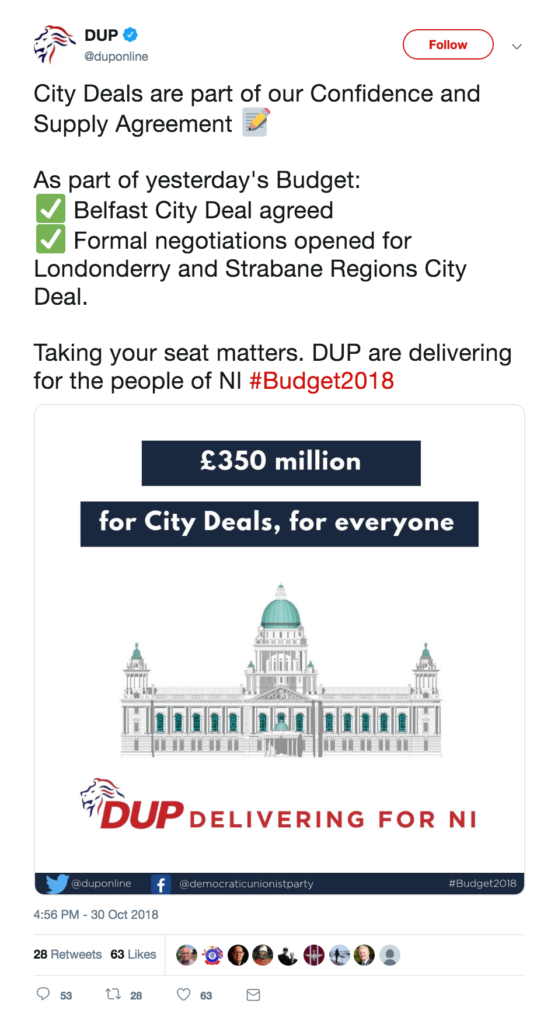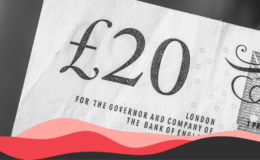- This claim is unsubstantiated.
- The DUP claim that “City Deals are part of our Confidence and Supply Agreement” is not explicitly referenced in the text of the Confidence and Supply Agreement they made with the Conservative Party, nor referenced by the Chancellor Philip Hammond in delivering his “Financial Statement” (29/10/2018).
- But as part of discussions between the Conservative Party and the DUP, the UK Government committed itself to working with the Northern Ireland Executive and other stakeholders towards city deals in Northern Ireland.
- The Belfast Regional City Deal was negotiated and agreed among Belfast City Council, the Secretary of State for Northern Ireland, and the UK Government.

UPDATED 1/11/2018 – The rating was “INACCURATE” in an earlier version of this fact check. A previous version of this article did not include the UK Government policy paper, “UK Government Financial Support for Northern Ireland”, as an outcome of Conservative Party discussions with the DUP. FactCheckNI appreciates the DUP bringing this new evidence to our attention. We have amended the conclusion to original claim from “Inaccurate” to “Unsubstantiated”.
The DUP claimed “City Deals are part of our Confidence and Supply Agreement” in the following tweet posted by the party on 30/10/2018:

This claim also includes the line “£350m for City Deals, for everyone”. The tweet states that the Belfast City Deal has been agreed and formal negotiations have opened for Londonderry and Strabane Regions City deal.
What is the Confidence and Supply Agreement?
In June 2017, Theresa May called a general election. The Conservatives won 318 seats, four short of the number a prime minister needs to form a Government with an absolute majority. This was problematic for Theresa May as it would have left her Government in a vulnerable position in relation to Brexit votes during the UK-EU negotiations.
She looked to the DUP and its 10 MPs to help give her a working majority of 328, in what was termed a “Confidence and Supply Agreement”. The Agreement is three pages long, and the relevant “Policy Agreement” section outlines the following areas of consideration as part of the Confidence and Supply Agreement:
Policy agreement
- Both parties have agreed that there will be no change to the Pensions Triple Lock and the universal nature of the Winter Fuel Payment.
- The parties agree to meet the NATO commitment of spending 2% of GDP on the armed forces. Both parties are committed to the Armed Forces Covenant and to its implementation throughout the United Kingdom
- Both parties agree to work together to consider options to support the highly successful reserve forces in Northern Ireland.
- The parties recognise the importance of the agriculture sector to Northern Ireland and the opportunities for growth that exist. Agriculture will be a critical policy area during the EU exit negotiations.
- The parties agree to continue to commit the same cash total in funds for farm support until the end of the Parliament. Further discussion will take place on the future framework for farming support.
There is no explicit reference to the Belfast City Deal (or wider City Deals) as part of the Confidence and Supply Agreement.
UK financial support
In addition to the Confidence and Supply Agreement, the DUP negotiated a pledge of Financial Support for Northern Ireland, covering economy and infrastructure, health and education, flexibility in the disbursement of funding previously allocated to shared education and housing, and a commitment to implement the legacy bodies agreed at the Stormont House Agreement.
The economy and infrastructure section of the financial support document includes the statement:
“The UK government is committed to working with the [Northern Ireland] Executive and other stakeholders to work towards a comprehensive and ambitious set of city deals across Northern Ireland to boost investment and help unlock the full potential of Northern Ireland.”
What is the Belfast City Deal?
City Deals are described by the UK Government as:
“…[a]n agreement between government and a city. It gives the city and its surrounding area certain powers and freedom to:
- take charge and responsibility of decisions that affect their area
- do what they think is best to help businesses grow
- create economic growth
- decide how public money should be spent”
The first two “waves” of city deals were delivered as part of the 2010 to 2015 Conservative and Liberal Democrat coalition government.
Further city deals were agreed for Glasgow and Clyde Valley (4/7/2014) and Aberdeen (28/1/2016), as examples of the UK government, Scottish government, and local authorities working together in economic investment.
On 22 November 2017 the Chancellor, Philip Hammond announced (Column 1052) that the Government “will open negotiations for a Belfast city deal as part of our commitment to a comprehensive and ambitious set of city deals across Northern Ireland”.
In the absence of a Northern Ireland Executive, negotiations for the Belfast Regional City Deal involved the UK Government, the Northern Ireland Civil Service, and Belfast City Council.
Belfast City Council submitted its negotiating position (proposal; summary) to the Northern Ireland Secretary of State and Westminster on 28 September 2018, and it held a partner reception at Westminster on 24 October 2018.
Throughout, DUP MPs have campaigned for a city deal for Belfast, including Gavin Robinson MP (2016; 2017) and Nigel Dodds MP (2018).
The Belfast Regional City Deal focuses on four key investment pillars: digital and innovation; infrastructure; tourism-led regeneration; and skills and employability. The proposals asked the UK government for £450 million in the impending budget as part of the deal.
Autumn Budget 2018
Philip Hammond, in delivering his budget in the House of Commons on 29 October 2018, stated that £350m would be allocated to the Belfast City Deal:
“I can also announce funding for further city and growth deals, including £150 million for Tay Cities, £350 million for Belfast and £120 million for North Wales, while negotiations progress with Ayrshire, Mid Wales and Borderlands, and will begin with Moray, Derry/Londonderry and Strabane as well.”
The £350m was £100m less than the £450m requested in Belfast City Council’s proposal to the Secretary of State in early October 2018.
Summary
The “City Deals” policy began in the previous Conservative and Liberal Democrat coalition government (2010-2015). It has extended into Scotland (in conjunction with the Scottish Government and local authorities in Scotland) and Northern Ireland (in conjunction with the Northern Ireland Executive and local councils in Northern Ireland). The UK Government’s support for city deals in Northern Ireland is not explicit in the “Confidence and Supply Agreement” between the Conservative Party and the Democratic Unionist Party, but is named in a subsequent financial support package agreed by the two parties. Whether the lack of UK Government support for a Northern Ireland city deal would be deemed a breach of the Confidence and Supply Agreement is open to debate. The Secretary of State for Northern Ireland represented the Northern Ireland Executive, in its absence, during the negotiations for the Belfast Regional City Deal, which was announced by the UK Chancellor of the Exchequer on 29 October 2018.
FactCheckNI is Northern Ireland’s first and only dedicated independent fact-checking service and a verified signatory to the International Fact-Checking Network’s Code of Principles. You can learn more about about FactCheckNI, our personnel, what our article verdicts mean, and how to submit a claim.




